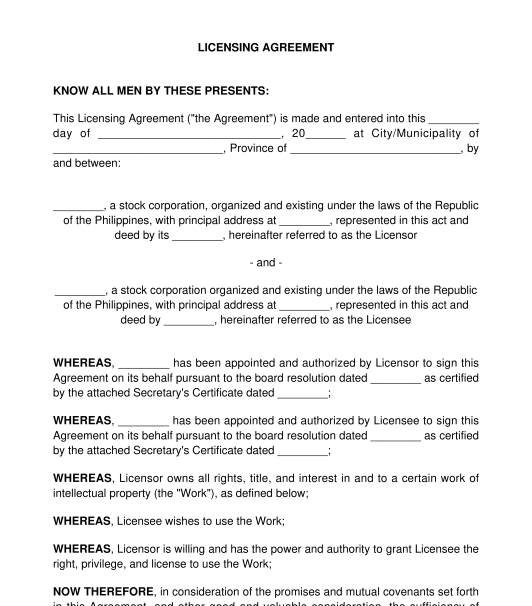 09/13/2025
09/13/2025

Answer a few questions and your document is created automatically.

Your document is ready! You will receive it in Word and PDF formats. You will be able to modify it.

 09/13/2025
09/13/2025
 Word and PDF
Word and PDF
 6 to 9 pages
6 to 9 pages
A Licensing Agreement is a document used by the owner of a copyright, trademark, or service mark (collectively, "intellectual property"), such as a photograph or illustration, to give permission to another person to use that intellectual property. The Agreement outlines how the Licensor (the person who owns the property) will grant the Licensee (the person who is allowed to use the Licensor's property) a license to use their intellectual property.
This document is used when the Licensor is okay with someone else using their property but ultimately wishes to retain their rights to the intellectual property and be compensated for the grant of the license. On the other hand, the Licensing Agreement allows the Licensee to use another person's intellectual property without infringing on their intellectual property rights.
A Licensing Agreement does not transfer ownership of the intellectual property rights.
The Licensor or the Licensee can draft this document. The user should enter all the information necessary to complete the document. Once completed, the Licensor and the Licensee, or their authorized representatives, should review the document to check the correctness and accuracy of the information.
If there will be attachments to the document, such as the authorizations for the representatives, said documents should be attached to the Licensing Agreement. Once the document is complete (including the attachments), the Licensor and the Licensee, or their authorized representatives, should sign the document.
Notarizing the document
If the parties want to acknowledge the document, this document also contains an Acknowledgment. An Acknowledgment is an act of a person before a notary public stating that the signature on a document was voluntarily affixed by him and he executed the document as his free and voluntary act.
Acknowledging the document is optional however, a document that is acknowledged before a notary public turns the document into a public document. Public documents are generally self-authenticating, meaning no other evidence will be needed to prove that the parties signed the Licensing Agreement.
If the document will be acknowledged, the parties (or their respective representatives) should present themselves before a notary public with all the original copies of the document and their attachments, if applicable, and swear an oath to the foregoing. The parties (or their respective representatives) should also bring a competent form of identification, such as a passport or driver's license. A competent form of identification is a current identification document bearing the photograph and signature of the parties (or their respective representatives) and should have been issued by an official agency.
If the document is acknowledged, the notary public will keep one original copy of the document. Both parties should each keep a copy of the document for their records.
Registration or Recording
It is generally not mandatory to register the Licensing Agreement but it is prudent to register the Licensing Agreement with the Documentation, Information, and Technology Transfer Bureau ("DITTB") to ensure that it can be enforced or at least to request for a preliminary review to ensure that it is valid.
If the intellectual property that will be licensed is a trademark, then the Licensing Agreement should be recorded with the Intellectual Property Office. This requirement is mandatory in order to have effect against third parties.
If the intellectual property is a copyright, then an exclusive Licensing Agreement can be registered with the National Library although this is not mandatory.
The Intellectual Property Code of the Philippines is the primary law that governs licensing agreements for intellectual property. However, the laws on contracts and obligations in the Civil Code of the Philippines and laws on taxes for royalty payments in the National Internal Revenue Code may also apply.
Under the Intellectual Property Code, Licensing Agreements that comply with the provisions of Sections 86 and 87 thereof don't need to be registered with the Documentation, Information, and Technology Transfer Bureau ("DITTB"). However, if it is later found that the Licensing Agreement does not comply with Sections 87 and 88 of the Intellectual Property Code, then the entire agreement will be unenforceable under Philippine Law.
You fill out a form. The document is created before your eyes as you respond to the questions.
At the end, you receive it in Word and PDF formats. You can modify it and reuse it.
Guides to help you
Intellectual Property License Agreement - template
Country: Philippines